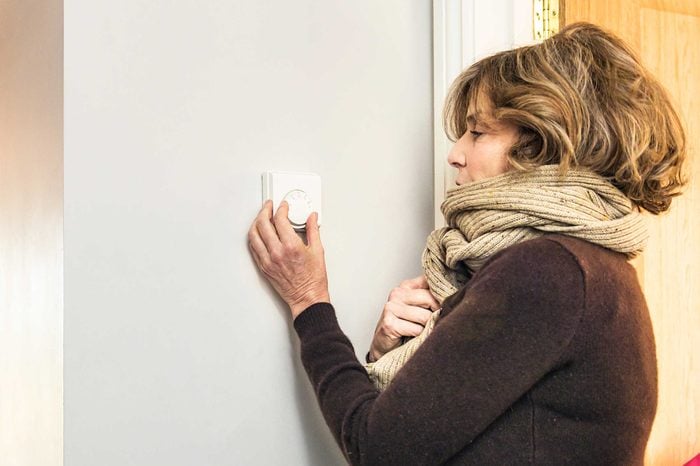
Fever
While uncommon, it’s possible to develop a low-grade fever with an upper respiratory infection (URI). If, however, that fever reaches 101 degrees or higher, there’s a greater chance that the URI has developed into pneumonia, especially if you also have a cough, explains Nicholas Pantaleo, MD, a family medicine physician at Westmed Medical Group in Yonkers, New York. (If it’s not pneumonia, could it be a sinus infection? Here are common sinus infection symptoms.)

Rapid heart rate
If you notice your heart beating faster than normal, take a moment to check your heart rate. Anything over 100 beats per minute is considered a rapid heart rate. “Usually, patients will feel shortness of breath and sometimes even experience chest pain,” says Dr. Pantaleo. If these symptoms persist, seek medical attention. Learn why pneumonia can increase your heart attack risk.

Chest pain
When an URI moves down into the lungs, a tightening of the chest and pain may occur. The American Lung Association says that one symptom of pneumonia is a sharp or stabbing pain in the chest, which will get worse when you cough or take a deep breath. Keep yourself healthy with these smart ways germ experts boost their immune systems.

Wet cough
A persistent cough is common with a URI. Eventually, that cough becomes productive and allows for the body to push out mucus. “A cough with pneumonia usually appears with fever and phlegm, says Dr. Pantaleo, and is consistently wet and rattly. So, if you have a cough that keeps bringing up mucus and doesn’t bring relief, you may have pneumonia. These are 10 other reasons your cough just won’t go away.

Blood-tinged mucus
If the mucus being produced by your cough is tinged with blood or has a rusty color, this is a potential sign that the discharge is coming from deep in the lungs, which indicates a lower respiratory infection such as pneumonia. Let your doctor know about this change as it may require a different course of treatment. Now, find out how the dentist can help you prevent pneumonia.

Chills
Patients with pneumonia often report teeth-chattering chills that cannot be remedied. Chills are a sign of fever and that the body is working overtime to regulate temperature. This is a sign that an upper respiratory infection has developed into pneumonia. (Regular pneumonia has key differences from walking pneumonia—learn more.)

Difficulty breathing
If you have been suffering a cold or upper respiratory infection and your breathing becomes shallow or labored, you may have pneumonia. This is a serious symptom that may require a nebulizer breathing treatment in order to open the lungs. Consult your physician immediately to avoid further issues from oxygen deprivation such as light-headedness, blood flow issues, or loss of consciousness. Watch out for these other 12 signs your “common cold” could be something worse.

